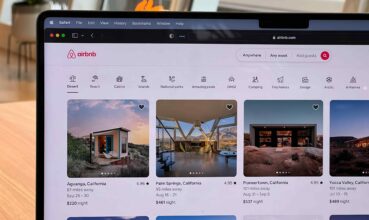While housing affordability dominates headlines and rectangular apartment blocks multiply across urban landscapes, one development firm is charting a different course. Cedar Street Partners ...
Airbnb & Vacation Rental Management Fee Breakdown [2024]


If you’re looking for a smart real estate investment, an Airbnb or vacation rental property may be a lucrative choice. In 2023 alone, more than 448 million Airbnb nights & experiences were booked, and the platform’s popularity will likely continue to grow.
Plus, investing in a vacation rental or Airbnb property is a great way to earn passive income, especially in places where tourism and business travel are high.
Whether you’re going it alone or letting a professional handle it, understanding the cost of Airbnb management and vacation rental management fees is a must.
Read on to learn how much it costs and what’s involved.
Key Takeaways
- Airbnb and vacation rental managers are responsible for property listings, guest relations, financial management, regulatory compliance, and maintenance.
- Property management fees can vary, often structured as a percentage of rental income, a flat fee per booking, or a combination of both.
- Vacation rental and Airbnb property management fees may include structures such as guaranteed income, fixed rates, and commission.
- Owners may be charged for setup, marketing, cleaning, maintenance, booking, cancellations, and other service fees.
- Hiring a manager can significantly reduce the time and effort property owners need to invest, and provide professional expertise in marketing and regulatory compliance.
What Does an Airbnb or Vacation Rental Manager Do?
So what, exactly, are you paying for, with those Airbnb management fees? We’ve outlined the typical duties of vacation rental managers, so you know what to expect.
Property Listings and Marketing
An Airbnb or vacation rental manager is responsible for creating and managing property listings across various online platforms. This includes writing detailed and attractive descriptions, taking high-quality photos, and setting competitive prices.
Guest Communication and Service
Effective communication with guests is a vital part of a rental manager’s duties. This includes responding promptly to inquiries or complaints, handling bookings, and providing guests with all necessary information about the property and surrounding area.
Maintenance and Housekeeping
Maintaining a property in top condition is important for guest satisfaction and safety. The rental manager oversees regular cleaning and housekeeping services to ensure the property is clean and presentable.
Financial Management
Vacation rental managers handle the financial aspects of property management. This includes setting and adjusting pricing based on market trends, managing budgets, and ensuring that all financial transactions are processed correctly.
Regulatory Compliance
A rental manager must be knowledgeable about local laws and regulations impacting vacation rentals. This includes obtaining any necessary licenses or permits, ensuring the property meets all safety and zoning requirements, and adhering to local tax regulations.
Reviews and Reputation Management
Managing online reviews is another key responsibility. A rental manager monitors and responds to guest reviews on various platforms. Plus, they address any negative feedback and highlight positive comments.
Is There a Difference Between Airbnb Managers, Vacation Rental Managers and Short Term Rental Managers?
There isn’t much difference between Airbnb managers, vacation rental managers, and short-term rental managers. Generally, these terms are used interchangeably.
A manager or management company often handles various types of properties under these categories. However, there can be some nuances in focus and expertise depending on the platform or type of property they manage.
Airbnb Managers
Airbnb managers specifically focus on properties listed on the Airbnb platform. Their expertise includes maximizing the property’s visibility and appeal through Airbnb’s specific listing features.
Vacation Rental Managers
Vacation rental managers might oversee properties listed across multiple platforms, not limited to Airbnb. They are adept at adjusting strategies to fit the requirements and features of different platforms such as Vrbo, Booking.com, or even specialized local sites.
Short-Term Rental Managers
Short-term rental managers typically focus on rentals that last a few days to a few months. They typically cater to both vacationers and business travelers. They often deal with faster turnover rates and manage bookings across multiple platforms.
How Much do Vacation Rental & Airbnb Property Managers Charge?
Vacation rental and Airbnb property managers typically charge for their services in one of several ways: a percentage of the rental income, a flat fee per booking, or a combination of both.
Here are some specific amounts for vacation rental and Airbnb property management fees:
Percentage of Rental Income
The typical range is between 10% to 30% of the rental income. Managers charging closer to 10% may offer more basic services, while those charging around 30% provide comprehensive management services.
This rate will also depend on the location, type of property, and the range of services provided.
Flat Fee Per Booking
These fees can range from $50 to $200 per booking, depending on the services included. This might cover basic administration, booking management, and guest communication but not extended services such as maintenance and housekeeping.
Some managers might opt for a flat fee per booking instead of a percentage. This can be advantageous for properties with higher rental prices or for owners who prefer a predictable cost.
Combination of Both
A combination of both a percentage and a flat fee is less common but can be tailored to balance the needs of property owners and managers:
For example, a manager might charge 15% of the rental income plus a $50 fee per booking. This model can ensure a steady income while also incentivizing properties to increase bookings.
What Are The Different Types of Fee Structures?
Vacation rental management fees can vary, depending on the structure in place. Below, you’ll find the three most common fee structures.
Guaranteed income
Under a guaranteed income fee structure, an Airbnb property manager agrees to pay the property owner a fixed amount each month regardless of whether the property is rented or not. This model shifts the risk from the owner to the manager.
For example, suppose a property manager offers a guaranteed income of $2,000 per month for a vacation rental. Even if the property only generates $1,500 in a month, the manager still pays the owner $2,000.
On the other hand, if the property earns $2,500, the manager still pays the owner $2,000, keeping any excess.
Fixed-rate
In a fixed-rate fee structure, the manager charges a specific, flat fee for their services each month.
For example, an Airbnb property manager might charge a flat rate of $300 per month to manage a small apartment. This fee is consistent every month, regardless of how many times the property is booked.
Commission
With a commission-based fee structure, the property manager earns a percentage of the rental income generated each month.
For example, let’s say a manager charges a 20% commission on an Airbnb and the property earns $10,000 in a month from rentals. In this case, the Airbnb management fee would be $2,000.
What Additional Fees Do I Need To Be Aware Of?
When considering the management of a vacation rental or Airbnb property, it’s important to be aware of potential additional short-term rental management fees including:
- Set-up fees
- Marketing fees
- Cleaning fees
- Maintenance fees
- Restocking fees
- Utility fees
- Booking fees
- Cancellation fees
- License and permit fees
- Technology fees
Should I Manage Myself or Hire a Property Manager?
Deciding whether to manage your vacation rental or Airbnb property yourself or hire a property manager involves weighing several factors. Here are some pros and cons of each approach to help you make an informed decision:
Managing Yourself
The pros of managing your short term rental property alone are:
- You can avoid paying the vacation rental and Airbnb property management fee
- You have direct control over every aspect of the rental process.
- Handling guest communications personally can lead to better tailored experiences.
The cons of managing it alone are:
- It requires a significant time commitment.
- You need knowledge of marketing, customer service, maintenance, and the legal aspects of short-term rentals.
- You’re always on-call for emergencies, handling last-minute bookings, and dealing with difficult guests.
Hiring a Property Manager
Here are the pros of hiring a vacation property manager:
- They handle all aspects of managing rentals, which reduces your time and effort.
- Professional managers bring experience and knowledge of the market.
- Property managers often use multiple platforms and professional marketing techniques to promote your property.
The cons of hiring a vacation property manager are:
- The property management fee can be a significant expense and reduce profits.
- You’ll have less direct control over your property’s day-to-day operations.
- Sometimes, a property manager’s interests may not perfectly align with yours.
Bottom Line
Investing in an Airbnb or vacation rental property offers more than mere financial returns—it opens the door to lucrative passive income. With the help of a vacation rental or Airbnb manager, you can enjoy a return on investment with minimal effort.
However, before embarking on this significant investment journey, it’s important to familiarize yourself with the associated fees and ensure that you hire a manager that aligns with your investment needs.
Similar Articles
Explore similar articles from Our Team of Experts.


“When you partner with people who are best in class and share the economics, you achieve better outcomes than trying to do everything yourself,” says Lee Brodsky, CEO of BEB Capi...


In an era where real estate ownership feels increasingly out of reach for many Americans, Daniel Dorfman and his company Roots are charting a different course. As founder of the Atlanta-base...


We’ve all been there – you find the perfect Airbnb, only to watch the price balloon at checkout as service fees and cleaning charges pile up. That exciting $200-per-night dream renta...


The halls of Santander’s Miami private banking office weren’t just where Ignacio Gil-Casares worked – they were where he and his partner spotted a crucial gap in the market...




